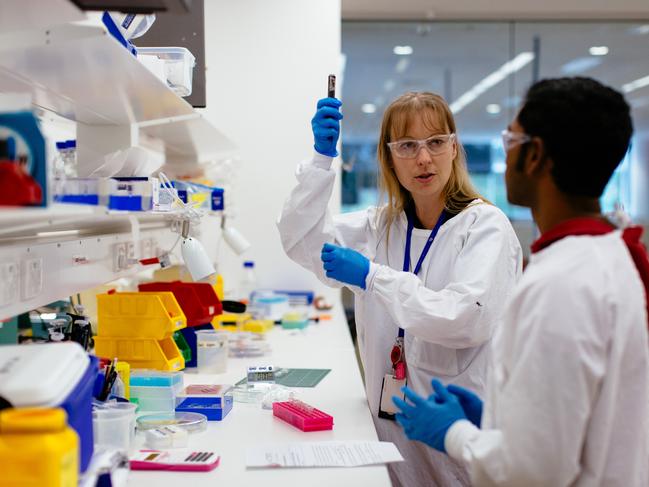Experimental Aussie drug could stop COVID-19 blood clots
An experimental anti-clotting drug developed by an Australian researcher might be able to help combat the blood clots that are killing COVID-19 patients.
Coronavirus
Don't miss out on the headlines from Coronavirus. Followed categories will be added to My News.
Exclusive: An experimental drug developed by an Australian researcher could hold the key to controlling the catastrophic blood clots killing COVID-19 patients.
Professor Shaun Jackson from the University of Sydney and the Heart Research Institute has developed an anti-platelet drug that can be used in combination with anti-clotting drug Heparin and clot-busting drug tissue plasminogen activator (tPA).
A key problem with anti-clotting medications is there is a risk they can cause massive bleeding in the brain and elsewhere in the body.
Professor Jackson said when these anti-clotting drugs were combined with his treatment the risk of bleeding was reduced.
A phase 1 trial of the drug in 72 people found the new treatment had no major side effects and a phase 2 trial in sick people was due to commence when COVID-19 happened, he said.
He is now talking to pharmaceutical companies and doctors in the UK and the US about trailing the drug in COVID-19 patients.
Three in four patients with COVID-19 who end up in ICU have microscopic blood clots which form in the heart, kidneys, brain and lungs and lead to organ failure.
There have been reports of COVID-19 patients suffering strokes and heart attacks caused by the clots.
“This is arguably the most aggressive clotting problem we have ever seen, it is highly unusual and it is so aggressive heparin (a blood thinner) is not working as we expected it would,” he said.

Medical director of Britain’s Thrombosis UK Professor Beverly Hunt told Medical News Today normally people have fibrinogen — a blood plasma protein that’s made in the liver — levels of 2–4 grams per litre in their blood.
However, patients with COVID-19 are presenting with up to 10-14 grams per litre of fibrinogen in their blood.
“I’ve been in this game forever, for decades, and I’ve never seen such sticky blood,” she said.
Professor Jackson discovered a new clotting mechanism when working on his PHD at Monash University 20 years ago and then tried to find a new class of drugs to target it.
“We were successful and one stood out and we’ve been very well supported by the NHMRC,” he said.
Fifteen million people globally have a stroke each year and anti-clotting therapies are a big business worth billions of dollars a year.
Professor Jackson said he has been trying to secure Australian funding to progress the drug and would like to manufacture it in Australia however “realistically we are probably going to have to manufacture it from China or India”.
Originally published as Experimental Aussie drug could stop COVID-19 blood clots


